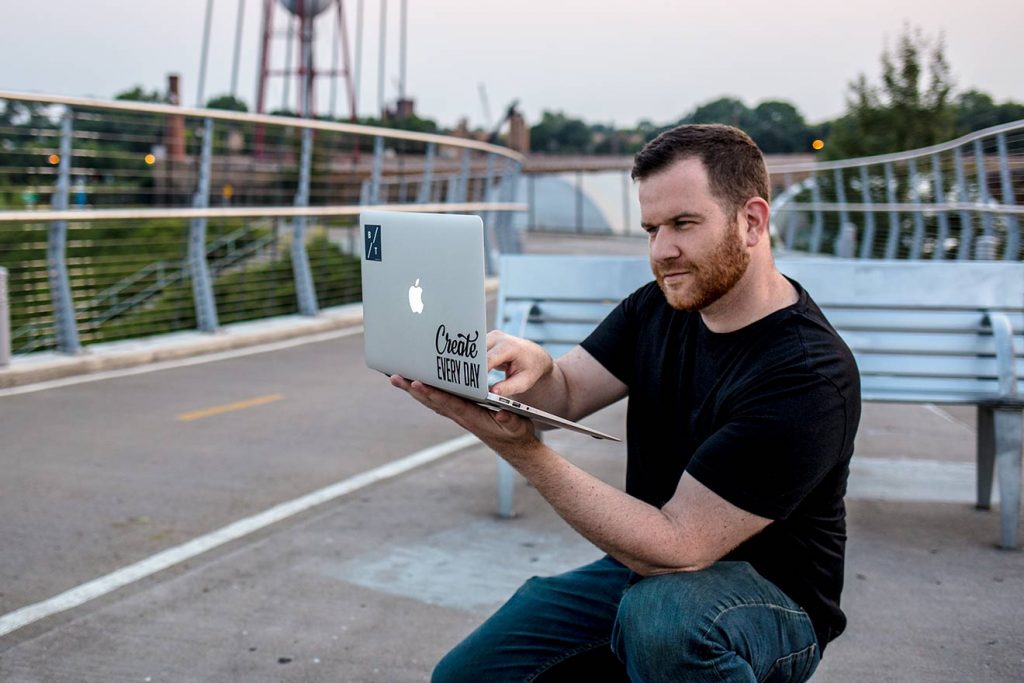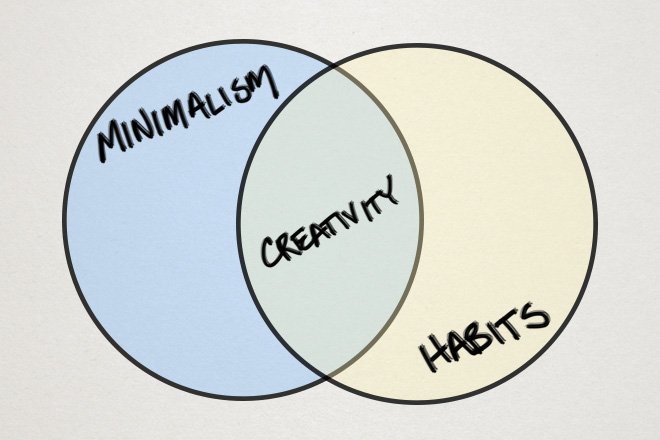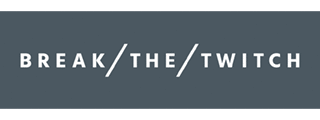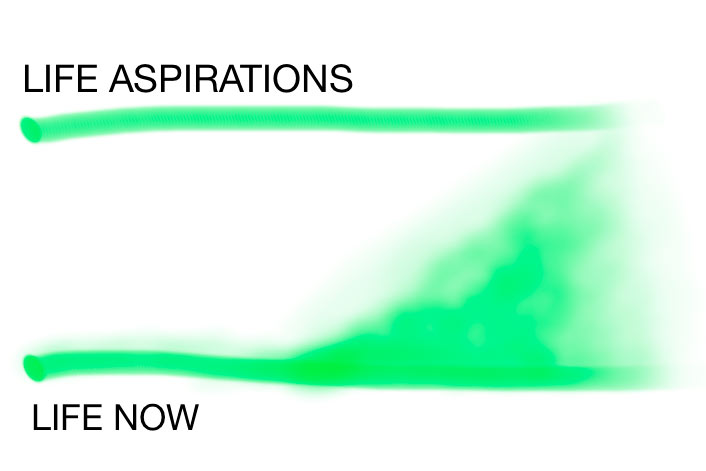
Over the last two and a half months, I’ve been heads down working on the writing of my first book.
The funny thing about writing a book about the Twitch, is that I got a *lot* of practice breaking it.
During the final few months, I’ve learned exactly what is necessary to finish a project of this size—and it was more than I expected. After all, writing a book is super easy and most of the time, I looked exactly like the above picture while writing.
Of course, that’s a lie and now I’m going to actually talk about what I learned during this super intense process.
I’ve been writing about minimalism, habits, and creativity as an intentional living framework for a few years now. Up to this point, I had applied it on smaller, short-term projects like blog posts and videos, the removal of clutter from our home, and taking daily action in health. But I’ve never applied it to something that required daily creative output for months on end.
At this point, I’m confident in continuing forward with those three topics as the focus for Break the Twitch and my work, which is great. It totally works. Happy to report that.

In addition to doubling down on that framework, I’ve had some major takeaways throughout the book writing process, many of which ended up in the book itself.
Here are some of the broad strokes of what I learned throughout the writing process of my first book.
As usual, if you’re more of a video person feel free to watch below, otherwise, onward!
Life, My Friends, Is Process
Seriously, 99% of our life is simply the process and ongoings of the things we do. The split moment that we finish is a fraction of the time we have on this earth. Through the highs and lows of writing this book, I learned that the process is just as important as the end result.
In fact, I believe that there is often more to be gained from the process of creating than what we actually create. We learn, we change, and become different people as the result of doing something and that creates more of a positive impact than having the final result by itself.
The Goal Is Creative Flow
My peak writing and creative output was attained when I entered a “flow state”, so my goal became to enter that state as frequently as possible.
I’ve been writing nearly everyday since the end of December 2016–in fact, I’ve written just over 95,000 words in 2017 as of the publishing of this article. I know this because my daily writing accountability partner, Mark Mazur, is about 18,000 words ahead of me right now (according to our spreadsheet).
Most of the words I’ve written haven’t landed in a public space, but exist in drafts and notebooks possibly never to see the light of day. Despite writing six days per week for the last eight months, I only really found a groove with it in the last three or so. The reason for that, is that I was able to consistently find a creative flow in my writing once I created the right environment for that.
> Creative flow is the mental state of operation in which a person performing an activity is fully immersed in a feeling of energized focus, full involvement, and enjoyment in the process of the activity.
The days where I’d enter a creative flow state, I would write 2,000 or more words without much effort or with little distraction. While my daily writing goal was just 500 words, flow days blew past that requirement with ease.
In addition to the higher output, the content was better, too. My editor Chantel mentioned that those chapters were consistently better than the others. So not only was the output much more prolific in this state, but the quality of writing was better, too.
Creative Flow Requires Focus
The funny thing about creative flow, is that once you’re in it, it’s pretty easy to stay in it. It’s that feeling of being in the zone and probably losing track of time. The challenge is that in order to attain a creative flow state, you need to focus long enough to get there.
I found there was a “ramping up” period where if I checked social media or checked my email whenever I thought of it, I’d never really get into the flow.
Achieving a flow state required focusing heavily on the task at hand, no matter how uncomfortable it was. I can’t tell you how many times I’ve stared at a completely blank page and felt like I had nothing to say, or how many times I’ve opened the 20,000 word Google Doc that holds my book and thought, “I wonder if any new emails have come in yet?” (I’d just checked 4 minutes ago).
That discomfort is actually a really important part of the flow process–it’s the first step in attaining it.
To get there, we have to be able to focus on what’s in front of us. We have to endure the discomfort and twitches that aim to temporarily solve the discomfort. The discomfort is the weight of the creative boulder we’re pushing up a hill, and it’s way easier to pick a flower than it is to keep pushing that boulder up.
Boulder, Meet Hill
Imagine pushing a boulder up a hill. At the top of this hill, is your flow state. This the point where the giant rock will go over the peak and start rolling down the other side with little effort on your part.
When the boulder takes off down the hill is your tipping point, but it won’t happen until you get the boulder up there. Now imagine along this upward hill path are fields of both beautiful wildflowers and invasive weeds.
As you begin pushing the boulder up the hill, you can’t help but notice a weed right next to the path. Because you’re just starting, you lean over to pull the weed out of the ground which lets the boulder roll a few feet backwards to where you started.
After some effort, you’re a little ways further up the hill when you see a group of lovely wildflowers. The flowers are just so lovely that you can’t help but pick a few of them. After collecting a few, you look back to see the boulder slowly rolling back to just in front of your starting position. Oops.
Focus Requires Minimal Distractions (duh?)
Once you get into a flow state, distractions become much less tempting. It’s much easier to stay in flow than it is to get there.
But, it is the intentional removal of distractions that allows us to get there in the first place. In the context of the above metaphor, it means a few different options. One is finding a path with boring grass instead of all those flowers and weeds. Another is planning ahead and spending a few hours clearing the way before you set out to push your boulder up. Finally, there’s putting blinders on so you can focus on what’s in front of you and nothing else.
Take A Different Path
While writing the book, I went to a lot of coworking spaces, coffee shops and anywhere that was outside our house. Our dog Rocky is truly a blessing in our lives, but being at home with him while trying to write isn’t very productive for me.
Most often, I went to a favorite coffee shop in our neighborhood. But if I wasn’t feeling it, I’d try somewhere else that day. Through mixing it up with coffee shops and other locations, I managed to get a lot of writing done. Don’t be afraid to change it up.
Clear The Way
In practice, this was having a notebook next to my laptop where I wrote down any urgent thoughts or impulses I had. It removed the idea from my brain while ensuring I wouldn’t forget it. Recording and clearing allowed me to maintain most of my focus instead of changing applications or otherwise.
I’d clear out my email inboxes, check social media, and make sure that Rocky was walked and fed before writing. Our brains all work differently, but for me it was helpful to clear the path before getting started on the big work. For some, the opposite may be true.
Wear Blinders
In the final months, I deleted all social media and email apps from my phone. I also blocked all social media sites with a Chrome browser extension called BlockSite. I set it up so that during my typical writing hours, between 10am and 5pm, all the sites that could possibly distract me were completely blocked.
It might seem extreme, but knowing I couldn’t check even if I wanted to made it easier to not even think about it at all. I found that even if I was consciously not using social media, I still thought about it and had to use discipline to not check it. Removing the option altogether completely eliminated issue, and I could absolutely feel the difference in my brain.
The more difficult or intimidating the project is, the more boundaries we need to set up to do our best work.
Potential Distractions Are Just As Bad
In researching for my book, I came across a study which indicates that even having our smartphones visible reduces our cognitive capacity for other tasks. So, even if you’ve turned off notifications, having your phone out is a reminder of the possibility of new things to check.
Every time you wonder if a new email came in, how many likes your last post got, or whatever else—these are the weeds on the hill.
When you completely block the possibility of being able to check your phone, you’re less likely to wonder. You’re less likely to suffer the consequences of the above study if your phone is silenced and put away. It might feel silly or childish to put these rigid structures around daily life, but the proof is in the pudding. Obviously, we can’t do this with all possible “distractions” in our lives, but there some that we can control in this way.
Distractions Aren’t Just “Twitches”
In the case of writing my book, I had a lot of distractions that were getting in the way. Many of those distractions weren’t actually “bad” things. They were just other things.
In the early spring, I launched a film production company and started working with video clients. All of a sudden, I had shooting dates and editing deadlines to manage. I was grateful to receive opportunities to speak, collaborate, and create some really cool stuff. But I was stressed out, overwhelmed, and the book writing had stalled.
Over the past couple months of writing the book, I created very few blog posts and videos. I realized that I needed to let go of those things while I doubled down on completing the book.
I found myself getting into a, “Well, I really should write a blog post.” –> “But, actually I should be working on the book.”
Going back and forth and then not being able to focus on either, causing guilt for both things. I needed to consciously let go of blog posts and videos for a while. Only then was I able to put my full attention into the book without feeling like I was falling behind.
When I hit that stressed-out point mid-year, I had about seven different projects going on at the same time. It was just too much for me. Despite the fact that I felt I should be able to handle it all, I couldn’t. So I pushed really hard to wrap up some projects I already had. I also said, “No” to opportunities where I would have otherwise said, “Yes”.
Through this I learned distractions aren’t always bad things. Sometimes they’re great things that simply need to be a lower priority than what’s already on the table.
We Are Humans, Not Machines. Yet.
We simply cannot expect the same output under the same conditions all the time. Creativity is messy, inconsistent, and difficult—but that’s what makes it worth doing. We change and adapt to our environment and sometimes need to shake things up. Even with productive writing days, I’d get burned out and not feel like anything good was coming out of me. In the moment, I felt hopeless.
I found that it’s so incredibly important to be kind to ourselves in this circumstance. Having bad days doesn’t mean you’re suddenly a terrible writer with no good ideas and should probably give up. Running into these days every once in awhile is a blessing. We can embrace that it’s a down day and be better off for it. Otherwise, the guilt makes it that much harder to get started again the next day.
Removing Excess Is Better Than Organizing It
One of the core principles of minimalism truly shone through during the editing process of this book. I found myself continually trying to restructure paragraphs and sentences to make them sound better. I’d try to make them fit into the overall structure, and couldn’t ever get it quite right. Until I deleted it.
When we have things we don’t need, it’s best to simply remove it. There is no sense trying to organize something that shouldn’t be there in the first place. This applies to home, manuscript, relationships, and more.
So In The End, It Works
I’m happy to report consciously minimizing distractions and practicing a daily writing habit to create consistently really works. About 20,000 words later I’m a few days away from having written my first book—to be honest, something I never quite expected that I’d do—and it feels great.
The beauty of writing a book about the Twitch and the False First Step is that I learned so much more about it throughout the writing process and was able to implement those learnings into the book as I wrote. I can’t wait to share this book (and audio book!) with you and to continue exploring what it truly means to live an intentionally connected life through minimalism, habits, and creativity.




